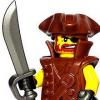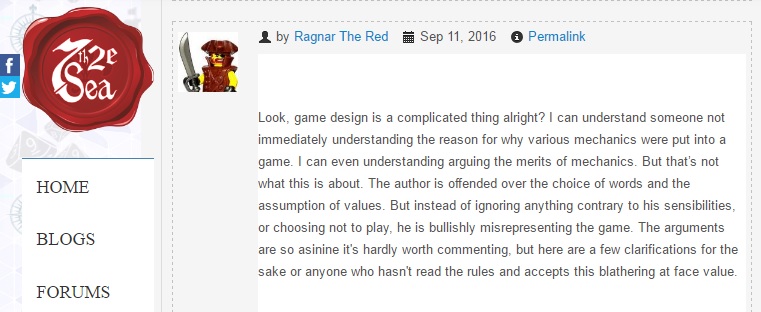This article was prompted by the "ask-me-anything" discussion started by Mike Curry, the Systems Lead on 7th Sea. And of course, the continued attempts to reanimate the decaying corpse of Absolute Morality into game design, especially in the 21st century, a morality of a bygone age and one of misplaced innocence.
THE IDEALISM OF IDEAS
Let us consider the game design principles behind 7th Sea with respect to morality and corruption and whether those mechanics are absolutely essential to make 7th Sea Second Edition a playable game.
The game designers of 7th Sea Second Edition may have been seduced by the idealism of “Absolute Morality” but unfortunately for them, even a casual reading of 7th Sea’s fictional and historic influences still reveal stark similarities to our real world. A recurrent problem with “Absolute Morality” in game design is hammering that square peg of moral mechanics into the many non-square holes that color the varied and diverse interpretations that real world players bring to the table.
7th Sea Second Edition may have been marketed as a game of classical “Swashbuckling” with the tried and tested trope of “Black and White” morality, but that alone does not immunize 7th Sea from modern criticism, especially over its desperate attempts to enforce Puritan morality upon hero characters? A detailed review of any of the old classics of the swashbuckling genre will uncover several moral inconsistencies within at least one of the varied cast of characters, even if the primary hero retains the ideal state of purity.
THE REALITY OF HISTORIC REFERENCES
Contrary to popular belief, games and fiction of the swashbuckling genre are already corrupted by their inheritance of real world historical references, especially cultures, societies, governments, and religions.
Let us look at my favourite novel “The Three Musketeers” by Alexander Dumas (circa 1840 A.D.). The historical reference is “Mémoires de M. d'Artagnan, capitaine lieutenant de la première compagnie des Mousquetaires du Roi”. And this itself pays homage to the historic novel written by Gatien de Courtilz de Sandras titled Les mémoires de M. d'Artagnan.
Who were these French Musketeers of the Guard (Musketeers of the military household of the King of France)? They were formed as a military group in the 1600s by King Louis XIII and armed with the new fancy muskets of that era, hence, their colloquial name. And in the time period of their formation, France was marked by bitter religious wars and violent divisions.
Now let us consider some fictional heroes from 7th Sea’s nation of Montaigne modelled as some pseudo-France. If we argue that Montaigne is not real France, then why is it modelled around what we romanticize as renaissance France instead of a fictional culture of Neanderthals. Okay, the game designers can model a fictional country around anything, but they still chose to inherit lots of historic French elements of the 16th and 17th centuries of our real world instead of the early Neanderthal culture of that region.
So since the game designers chose to ignore the Neanderthal culture, we can also conveniently focus on two fictional heroes from 7th Sea’s Montainge modelled around pseudo-French society.
- One will be a military commander, and our dashing hero, modeled after d'Artagnan.
- The other will be a superb spy, and our femme fatale, modeled after Milady DeWinter.
So what actions could our fictional d’Artagnan take that would dent the idealism of Absolute Morality? As a military commander, it is quite reasonable for him to order assaults upon enemy positions. During such assaults, both wounded and unarmed soldiers may get shot to death, because in the fog of war, there is not enough time to kindly go round confirming the helplessness of all enemies to avoid “murdering” them as per 7th Sea game mechanics.
And what actions could our patriotic spy Milady DeWinter take against the enemies of Montaigne? She could be sent to assassinate an enemy commander who is a hero to his own Avalonian people but a villain to Montaigne. A successful assassination that ends a war quickly would be a heroic deed that saves many lives, except in 7th Sea where this is considered a villainous deed. Go figure how taking one life to save many is non-heroic.
These two heroes were chosen to compare and contracts moral conflicts that will not make either one any less of a hero in the real world, but will only affect their hero status in those fictional worlds that worship Absolute Morality as a fundamental aspect of the universe.
ABSOLUTE MORALITY HANDICAPS 7th SEA FICTION
And finally, we have come to the crux of this brief discussion. Why are some game designers seduced by the need to mechanically construct rules for Absolute Morality into Role Playing Games? Why create mechanical straight-jackets to punish players who play their hero characters creatively and within historic precedents in the real world? Gary Gygax (God bless his soul) started us down this path of morality and alignment in games and the conflicted separation of good versus evil and law versus chaos. The most notorious child of this idealism is the fictional Paladin archetype:
Typical tenets of the Paladin code in Dungeons and Dragons require the following compliance:
- A Paladin must be of Lawful Good alignment.
- A Paladin may never willfully commit an Evil act.
We can see a similar mechanic corrupt 7th Sea’s great game design, with the implicit statement in the 7th Sea Second Edition Core Rulebook that heroes never commit murder.
EXCERPT: Page-296 of the 2nd Edition Core Rulebook:
In the 7th Sea game system, characters aren’t killed, they become Helpless. Even gunfire cannot kill a character without a deliberate act from a Hero or a Villain.
Okay, the above statement beggars belief. Gunfire would include canon-fire I presume. Even the inaccurate musket fire is surely prone to hit and kill an innocent bystander. And yet the creators of the game still tried to preach to us that death is never accidental but deliberate?
And then the convoluted statement with regards to in-game murder continues as follows…
EXCERPT: Page-296 of the 2nd Edition Core Rulebook:
For the most part, killing a Helpless person is an unjustified killing. A murder. An Evil Act, under nearly any and all circumstances. Heroes do not commit murder. Ever. But Heroes do kill when their hands are forced by Villains and their cronies.
EXCERPT: Page-296: It’s Your Call
In the end, as Game Master, you have the final say over all actions.
Where the game designers deliberately writing a fairy tale for five year olds? They included fiction about wars but then deliberately tried to create rules to hide murder under the table. After various contradictory statements, the designers ended with another escape clause by stating the GM is still the final arbiter anyway. So why did 7th Sea game designers waste so much time trying to justify Moral Purity that was never even needed in the first place.
Below is a list of other statements in the core rules that may stifle over moral conundrums.
EXCERPT: Page-27 of the 2nd Edition Core Rulebook:
Only the most unforgivable sins—the murder of a family member or the like—will force a family to use its most dreaded punishment: ostracism.
Read that key phrase “family member or the like” which any reasonable person would agree does not preclude murder of one’s enemies.
EXCERPT: Page-124
The War of the Cross was a three-decade-long mass murder.
Any reasonable leader would agree that military heroes were a thing in that era, and though we could assume the phrase “mass murder” is used figuratively, we can also assume that military leaders on opposing sides of that war could have been considered heroes of their respective nation. and as leaders the actions of their soldiers would reflect upon them, including actions such as collateral damage (killing non-combatants) that follows most artillery barrages ordered by military leaders against enemy ports and even cities.
EXCERPT: Page- 267
All that matters is that young soldiers are not forced to march out onto a field and murder one another by the hundreds.
Notice above that in mature fiction, the deaths of soldiers in war can still be referred to as “murder” whether as a figure of speech or statement of fact. Historical evidence of our own world showcases unarmed and wounded enemy soldiers killed by cannon shot, and the commanders who ordered such artillery fire can still be considered war heroes regardless.
Despite the designers of 7th Sea forcing Absolute Morality as a pre-requisite for heroism, they still included references to warfare within the game world and warfare brings forth military victories and military heroes who may have murdered innocents inadvertently through collateral damage. Yet, because of the rules of artificial morality deliberately baked into 7th Sea’s game design, modern GMs and players must twist and bend their characters around Puritan rules instead of being free to narrate authentic stories of military heroism.
Without the artificial “Absolute Morality” handicap, 7th Sea fiction is free to narrate stories of death and murder and heroism, including the stoyr of the heroic assassin who murdered the enemy commander with a well-placed arrow thus shortened the long war while preventing many more unnecessary casualties.
EXCERPT: Page-296 (the icing on the cake)
Characters aren’t killed by accident in 7th Sea. Even gunfire cannot kill a character without a deliberate act from a Hero or a Villain.
Now this particular phrase crossed the boundary from simple incredulity to outright implausibility. 7th Sea is a game that speaks of the War of the Cross in its fictional history and yet, the game designers are trying hard to spin the narrative that every single character killed in that war was killed deliberately and knowingly, with heroic commanders who ordered cannon fire and musket shots monitoring their troops to ensure their targets were not shot dead when already down? Really? Was that the War of the Cross for 4 year olds?
Finally, acknowledging the ridiculousness of the “Absolute Morality” mechanic the designers added one line in the published version as a sliver of hope with the phrase “for the most part” to allow the GM an excuse not to punish every single hero who lives life on the edge.
PAGE:-296
For the most part, killing a Helpless person is an unjustified killing.
COMMONSENSE MORALITY RULES FOR PLAYER CHARACTERS
If we accept that games are a form of entertainment with at least some intention of making real world players happy, then the most reasonable solution of handling heroism and villainy of player characters is to refrain from deliberately punishing player characters and, instead, offer flexible interpretations of heroic morality.
Because different players who come together to play may come from diverse backgrounds and represent different cultural outlooks, it is best to read the 7th Sea Second Edition Core Rulebook as a guide instead of the Absolute Puritan template for every single hero character.
So in closing, at my table, your heroes will not be punished if you narrate a justification for controversial in-game actions, and if agreeable to other players at my game table, your hero remains a hero unless you chose to fall. So enjoy 7th Sea Second Edition and create some memorable stories with your hero characters.
Blood will flow and the sun will shine.
Arrgh!









